Dear Miss Perkins: A Story of Frances Perkins's Efforts to Aid Refugees from Nazi Germany (February, 2026)

She was the first woman to serve in a presidential cabinet, the longest-serving Labor Secretary, and an architect of the New Deal. Yet beyond these celebrated accomplishments there is another dimension to Frances Perkins’s story. Without fanfare, and despite powerful opposition, Perkins helped save the lives of countless Jewish refugees fleeing Nazi Germany.
“Immigration problems usually have to be decided in a few days. They involve human lives. There can be no delaying,” Perkins wrote in her memoir, The Roosevelt I Knew. In March 1933, at the height of the Great Depression, Perkins was appointed Secretary of Labor by FDR. As Hitler rose to power, thousands of German-Jewish refugees and their loved ones reached out to the INS—then part of the Department of Labor—applying for immigration to the United States, writing letters that began “Dear Miss Perkins . . .”
Perkins’s early experiences working in Chicago’s famed Hull House and as a firsthand witness to the horrific Triangle Shirtwaist fire shaped her determination to advocate for immigrants and refugees. As Secretary of Labor, she wrestled widespread antisemitism and isolationism, finding creative ways to work around quotas and restrictive immigration laws. Diligent, resilient, empathetic, yet steadfast, she persisted on behalf of the desperate when others refused to act.
Based on extensive research, including thousands of letters housed in the National Archives, Dear Miss Perkins adds new dimension to an already extraordinary life story, revealing at last how one woman tried to steer the nation to a better, more righteous course. [from publisher web site]
Transformative Work Design: Synthesis and New Directions (January, 2026)
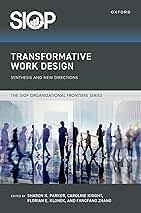
How do we create healthy, meaningful, and productive work in the face of hybrid work models, shifting careers, technological advances, an aging workforce, and other such major contemporary changes? Transformative Work Design explores this crucial question by presenting a thorough, evidence-based view of work design. With contributions from 49 highly eminent authors in the field across 25 chapters, it synthesizes research on how work design influences critical outcomes like worker motivation, mental health, well-being, and job performance for individuals and teams.
The book also covers key methodologies for studying work design and explores new areas of research. For instance, authors explore how work design can shape identity and personality development, moving beyond the usual focus on wellbeing and performance outcomes. Additionally, the book shifts the traditional emphasis from understanding the outcomes of work design to unpacking the antecedents of work design. Chapters explore how various individual, team, organizational, and global factors shape the way people's work is designed, laying the foundation for understanding how to successfully redesign work.
Picking up this perspective, several chapters focus on how to change work design. By discussing 'top down' work redesigns, such as self-managing teams, and 'bottom up' approaches like playful work design and job crafting, pathways to creating better work are identified. A final section highlights critical issues raised by large-scale technological and demographic shifts, such as remote working trends, population aging, and rapid digitalization. [from publisher web site]
Ebook available to Cornell community: https://catalog.library.cornell.edu/catalog/16872536
Labor on the Line: Justice at Work on Assam Tea Plantations (December, 2025)

Labor on the Line provides insights into the world's largest tea-growing region of Assam. Anna-Lena Wolf examines everyday conceptualizations of justice: how they emerge, become prevalent, transform, and are negotiated by differently positioned actors on Assam's tea plantations. Academics and activists have criticized the conditions on these plantations as a form of bondage, arguing that the persistence of a colonial wage structure—characterized by low cash wages supplemented with in-kind benefits—reinforces laborers' dependence on plantations. But Wolf shows that there is more to the story. Tea plantation laborers and trade unionists formed surprising alliances with managers and plantation owners based on everyday conceptions of justice. All involved favored the old-style plantation at a time when fundamental changes were appearing in the political economy of tea production.
Labor on the Line challenges the simplistic notion that dismantling tea plantations would create a better world for tea plantation laborers, by advancing notions of justice in innovative ways. [from publisher web site]
Legalized Inequalities: Immigration and Race in the Low-Wage Workplace (November, 2025)
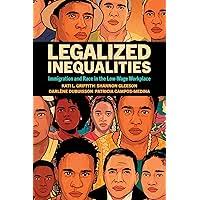
This book illuminates how government regulation (and under-regulation) degrades workplace conditions, as well as workers' ability to contest them. The authors interpret government action and inaction broadly to include statutory frameworks, enforcement systems, and other implementation processes. They also include both punitive arms of governance and everyday mundane aspects of government bureaucracies. Through enacting, enforcing, administering, and interpreting laws, or by deciding not to do so, the government feeds poor working conditions and disempowers workers. The three parts of the book disaggregate and interrogate three key policy arenas through which this occurs: under-regulation of workers' rights, an immigration regime that disempowers workers, and failure to counteract racialized labor hierarchies and colonial legacies. The book examines three domains successively, via three pairs of chapters that focus on how the government fuels precarious working conditions and shapes barriers and pathways to change. Throughout, the authors highlight instances where workers have resisted despite the odds-sometimes individually, sometimes collectively; sometimes quietly, sometimes loudly. [from publisher]
Ebook available to Cornell community: https://catalog.library.cornell.edu/catalog/17172800
Good Kids: The Politics of Child Labor in the Global South (October, 2025)
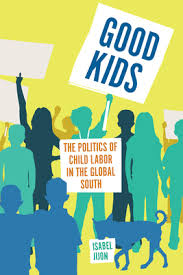
One in ten children worldwide is involved in some form of child labor. While almost half are in occupations that put their safety at risk, the other half have "gray" jobs like industrial farming or selling candy on the street. Children in these positions often defend the value of their work, and some even join social movements to demand the "right to work with dignity." In Good Kids, Isabel Jijon reveals how global campaigns against child labor are often met with resistance from the very children they are meant to protect. Conducting interviews in Bolivia and Ecuador with children who defend their labor, Jijon explores what they mean by "value," "rights," and "dignity" in this context. She finds that working children seek a sense of self-worth, as well as worthiness in their closest relationships; they use work to prove that they are "good sons/daughters," "good friends," or simply "good kids." Drawing, also, on interviews with reformers invested in ending child labor, Jijon produces a nuanced picture of the ways that global campaigns can, unintentionally, undermine these relationships and make working children feel stigmatized rather than protected. This fascinating and challenging study of moral meaning-making upends simple understandings of harm and worthiness in a vast but poorly understood labor market. Also published with the title Good kids: why children demand the right to work with dignity.
Ebook available to Cornell community: https://catalog.library.cornell.edu/catalog/17121205
We are the Union: How Worker-to-Worker Organizing is Revitalizing Labor and Winning Big (September, 2025)
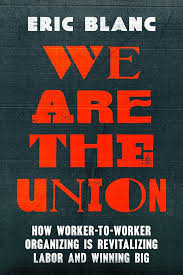
A riveting account of labor's bottom-up resurgence, providing a roadmap for workers, unions, and social movements to win widely.
After decades of union decline and rising inequality, an inspiring wave of workplace organizing—from Starbucks stores to Amazon warehouses to southern auto factories—has thrust unionization into the national spotlight. By analyzing this surge and telling the stories of the courageous workers driving it forward, We Are the Union makes a case for how to overcome business as usual in both corporate America and organized labor.
Eric Blanc shows that recent struggles have developed a new organizing model, worker-to-worker unionism, which builds scalable power by giving rank-and-filers an unprecedented degree of leadership. Through digital tools and ambitious campaigns, young worker leaders are turning the labor movement back into a movement—and they're winning. Rigorously researched and compellingly written, We Are the Union illustrates how this new grassroots approach can exponentially grow the power of working people to overcome economic exploitation, racial injustice, and authoritarianism at work and beyond. [from publisher web site]
Ebook available to Cornell community: https://catalog.library.cornell.edu/catalog/16685313
I Didn't Come Here to Lie: My Life and Education (August, 2025)
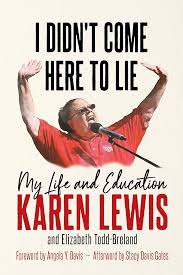
In 2012, Karen Lewis led the Chicago Teachers Union to a historic strike, challenging the city’s powerful mayor and paving the way for an unprecedented wave of teacher strikes in the decade that followed.
But Lewis’s life took her in rich and surprising directions long before she landed in the CTU President’s office. I Didn’t Come Here to Lie, written in collaboration with historian and education expert Elizabeth Todd-Breland, tells Lewis’s story in full for the first time, capturing her lively wit, her charisma, and her commitment to building the schools and communities teachers, students, and families deserve.
From her childhood on Chicago’s South Side to her teen years organizing Black Power walkouts, from her education at Mount Holyoke and Dartmouth to her years in Oklahoma and Barbados and her stints in medical school and film school, readers follow Lewis through a life full of exploration. Wherever she was, she maintained a strong commitment to building fairness. She found her calling in the classroom, teaching science for more than twenty years before becoming a union leader in Chicago.
Up until her untimely death from brain cancer in 2021, Karen Lewis was spirited, unshakeable, and fierce. She remains a model for current organizers and teachers doing the day-to-day work of building a better world. I Didn’t Come Here to Lie is a testament to one of the true revolutionaries of her generation. [from publisher web site]
Los Yarderos: Mexican Yard Workers in Transborder Chicago (July, 2025)
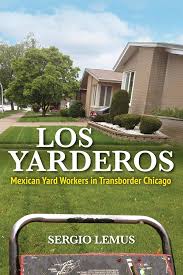
Migrants from the Mexican states of Zacatecas, Guanajuato, Jalisco, and Michoacán have become an important presence in Chicago and the Midwest. Many hold jobs as yarderos gardening, caring for lawns, and doing other landscaping work.
Sergio Lemus explores the lives of these migrants and looks at the struggles they face as they work to make the city their home. Drawing on fieldwork in South Chicago, Lemus tells the stories of first and second-generation yarderos and discusses the historical, economic, cultural, and political ramifications they face as they acquire their working-class identity. Lemus’s compassionate portrait places them within America’s ongoing tradition as a nation of immigrants while analyzing their place within today’s transborder cultural moment.
Perceptive and humane, Los Yarderos reveals how a group of Mexican immigrants navigates the crossings of the borders that divide class, color hierarchies, gender, and belonging. [from publisher web site]
Canaries in the Code Mine: Precarity and the Future of Tech Work (June, 2025)
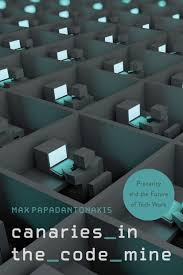
The idea that the tech industry is a secure field with jobs and opportunities for growth is a myth. There is widespread precarity among software developers, who experience uncertainty, anxiety, and imposter syndrome as technological advancements threaten job security. Max Papadantonakis investigates this phenomenon in his revealing study, Canaries in the Code Mine. He indicates that precarity is not just about the risk of losing one’s job; it is about living in a career where basic needs and rights are not guaranteed.
Interviewing 120 software developers from leading tech firms, Papadantonakis shows how temporary contracts, project cancellations, and company downsizing undermine the security of even highly skilled professionals. He also highlights the systemic inequalities that shape the tech industry, showing how age, race, and gender often dictate the opportunities and responsibilities software developers have—or are denied.
Canaries in the Code Mine highlights a disturbing reality of privilege and vulnerability within the tech industry. Papadantonakis engages in a critical discourse on the evolving nature of work in the digital era, emphasizing the need to shape an equitable future in the rapidly evolving landscape. [from publisher web site]
Fighting Toxic Ignorance: Origins of the Right to Know about Workplace Health Hazards (May, 2025)
